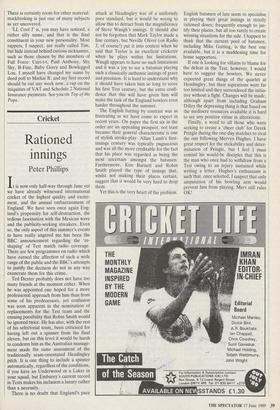Cricket
Rationed innings
Peter Phillips
Ted Dexter probably does not have too many friends at the moment either. When he was appointed one hoped for a more professional approach from him than from some of his predecessors, yet confusion was soon apparent in the nomination of replacements for the Test team and the ensuing possibility that Robin Smith would be ignored twice. He has also, with the rest of his selectorial team, been criticised for having left out a spinner from the final eleven, but on this level it would be harsh to condemn him as the Australian manage- ment made the same assessment of the traditionally seam-orientated Headingley pitch. It is one thing to include a spinner automatically, regardless of the conditions, if you have an Underwood or a Laker in your squad, but Emburey's current record in Tests makes his inclusion a luxury rather than a necessity.
There is no doubt that England's pace attack at Headingley was of a uniformly poor standard, but it would be wrong to allow this to detract from the magnificence of Steve Waugh's innings. It should also not be forgotten that Mark Taylor made a fine century, but Neville Oliver (on Radio 3, of course!) put it into context when he said that Taylor is an excellent cricketer when he plays within his limitations. Waugh appears to have no such limitations and it was a joy to see a batsman playing such a classically authentic innings of grace and precision. It is hard to understand why it should have taken him so long to score his first Test century, but the extra confi- dence that this will have given him will make the task of the England bowlers even harder throughout the summer.
The English batting by contrast was as frustrating as we have come to expect in recent years. On paper the first six in the order are an appealing prospect, not least because their general characteristic is one of stylish stroke-play. Allan Lamb's first- innings century was typically pugnacious and was all the more creditable for the fact that his place was regarded as being the most uncertain amongst the batsmen. Furthermore, Kim Barnett and Robin Smith played the type of innings that, whilst not making their places certain, suggest that it would be very hard to drop them.
Yet this is the very heart of the problem. English batsmen of late seem to specialise in playing their great innings in strictly rationed doses; frequently enough to jus- tify their places, but all too rarely to create winning situations for the side. I happen to think that the current pool of batsmen, including Mike Gatting, is the best one available, but it is a maddening time for home supporters.
If one is looking for villains to blame for the defeat in the Test, however, I would have to suggest the bowlers. We never expected great things of the quartet at Headingley, but their aspirations were far too limited and they surrendered the initia- tive without a fight. Changes will be made, although apart from including Graham Dilley the depressing thing is that based on the mediocre resources available it is hard to see any positive virtue in alterations.
Finally, a word to all those who were seeking to create a 'cheer club' for Derek Pringle during the one-day matches to rival the one following Mervyn Hughes. I have great respect for the stickability and deter- mination of Pringle, but I feel I must remind his would-be disciples that this is the man who once had to withdraw from a Test owing to an injury sustained while writing a letter. Hughes's enthusiasm is such that, once selected, I suspect that only amputation of his bowling arm would prevent him from playing. Mery still rules OK!


















































 Previous page
Previous page